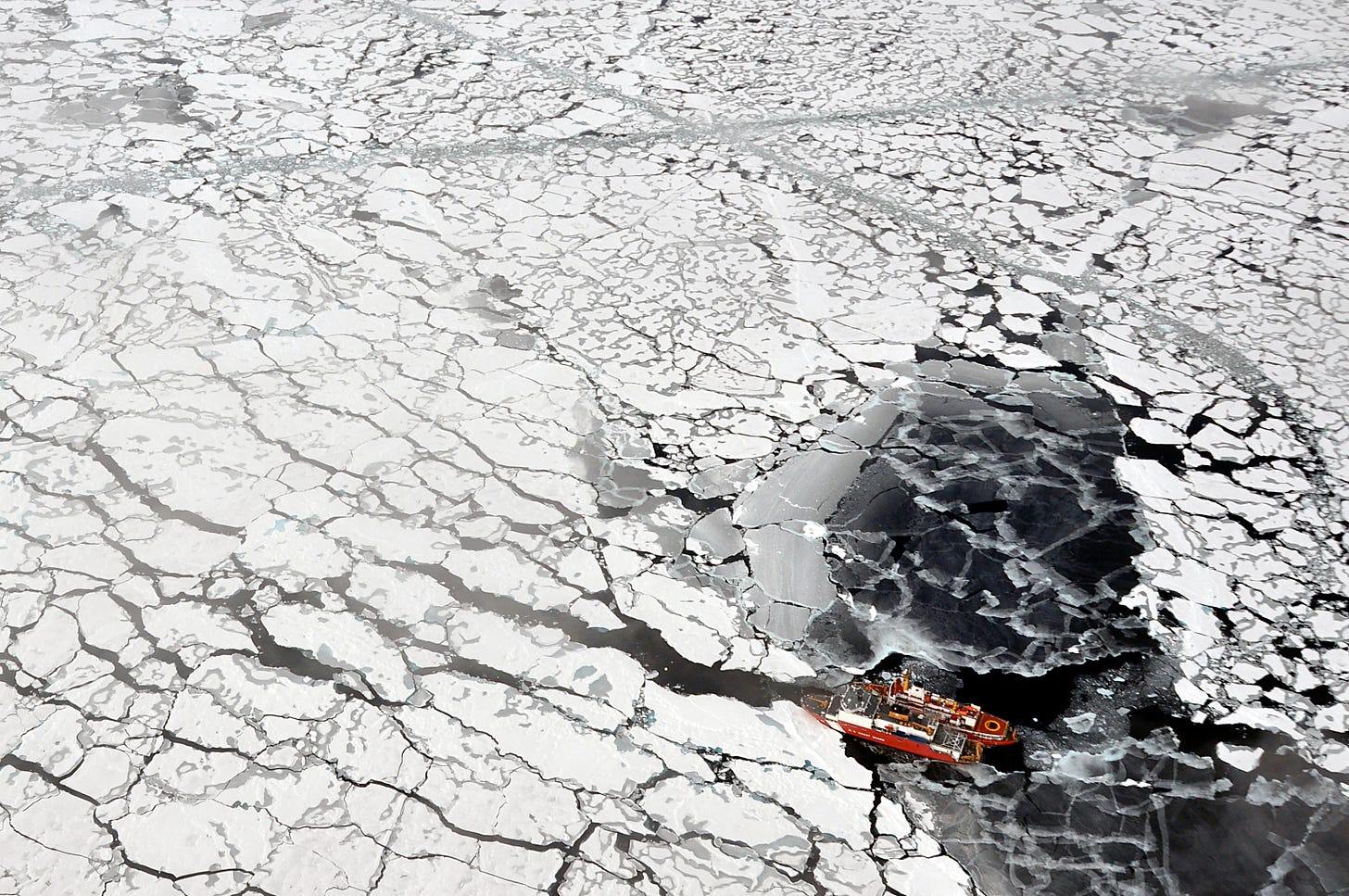Debating degrowth
The limits of liberal climate politics, Jason Hickel on the last five years of debating degrowth, and a glimpse into a the dawn of a 'new Arctic'
Welcome to the *first* newsletter from the BREAK–DOWN!
Fresh from our expansion out of the digital realm and into the physical with our first print issue, Right Turn (available here!), we’re now pushing ever further with our 4d strategy for ecosocialist hegemony: by launching a substack.
The aim of this newsletter is to bring you the best new writing on capitalism and the climate crisis every fortnight. Expect original essays from our writers and contributors, analysis from the BREAK-DOWN’s editors, round-ups of the best new research and writing from elsewhere, and more.
With that in mind, our first offering brings you an interview with Jason Hickel, providing something of a retrospective on where the climate movement in the Global North stands now, and how far it has come in the five years since his landmark book, Less is More: How Degrowth Will Save the World, was published. Much has changed in that time, of course, chief among them the ways in which we work and organise as a result of the pandemic. In the case of the climate, these years have been largely defined by stasis or, with depressing frequency, backsliding.
Our first issue was in many ways a stocktake of this backsliding, analysing how the minor advances that liberal climate politics achieved over the past decade or two have so easily been rolled over by a renewed onslaught from both the right and from the resilience of capital. As Adrienne Buller and Geoff Mann noted in the issue’s introduction, “things are bad, and they are for the moment getting worse, but the exhortation to suppress this truth in the interests of coddled ‘hope’ and forced optimism has been one of the least compelling aspects of (some parts) of the climate movement.” There is power in confronting the forces of reaction with clear eyes.
Yet there have also been green shoots. Among these has been the growing awareness, and even acceptance (however critical) of the idea of degrowth—and not just on the ecologically-minded left. From recent BBC special features on whether degrowth can “save the world” to mentions of degrowth in the IPCC’s Sixth Annual Report, and even in its increasingly frequent denunciation by right-wing press and celebrity economists, there’s no denying that the idea has penetrated the mainstream.
For that, alongside the hugely popular work of Kohei Saito, Jason Hickel can take much of the credit. His book, Less is More, was first published in 2020, and for the first issue of our newsletter we are thrilled to share an interview with him, conducted by Andrew Ahern, reflecting on the half-decade since the book’s publication.
We will also shortly be announcing details about the second print issue of the magazine, due out in September. You will soon be able to pre-order that on our website, or you can subscribe now and get the first issue while you wait. As an independent and not-for-profit outlet, your support makes our work possible—so subscribe to support the best in new writing on climate and capitalism.
– John Merrick (co-editor of the BREAK—DOWN)
In Case You Missed It
Essential reading from the last few weeks, handpicked by the BREAK–DOWN editors.
1. Socialism or Banan-ism
Writing in the NYRB, Casey Williams offers a measured assessment of the competing arguments that have shaped the degrowth debate. Weighing up the debates on eco-socialist strategy by the likes of Hickel and Saito, against the combative eco-modernism of previous BREAK–DOWN contributor Matthew Huber, what emerges is a carefully drawn balance sheet which, while offering necessary critiques of both sides of the debate, takes some of the heat out of the polemics. As Williams writes:
As anyone who has read about concentrated animal feeding operations or Amazon warehouses knows, capitalism hardly organizes production in neutral ways: the profit imperative encourages the development of “productive forces” that cannot necessarily satisfy social needs in an ecologically rational fashion. For instance, using colossal amounts of insecticides to produce ever-increasing quantities of genetically identical bananas may be good business, but today’s banana plantations could not simply be seized by workers and made to serve an ecologically conscious socialism. What’s needed is a totally different way of producing bananas—and probably far fewer of them.
2. Make Them Pay
In a watershed moment for the global climate movement, last week saw the International Court of Justice hand down a ruling requiring high-emitting countries to reduce their emissions below 1.5 degrees of warming, or otherwise face the threat of reparations. As Harj Narulla, the barrister representing the Solomon Islands in the case, told the Guardian, this is “the most significant climate decision ever issued by a court”. Stay tuned for our next newsletter featuring an interview with Narulla (!), but for now I urge you all to read his recent essay:
[This] it is a victory for everyone – a clear statement that the status quo isn’t sufficient. We must act now to confront the climate crisis. And in a moment when hope feels hard to come by, that’s very good news indeed.
3. Gas, Gas, Gas
Less welcome was the news that Lee Zeldin, the administrator of the Environmental Protection Agency, planned to revoke the scientific determination that underpins the US government’s legal authority to combat climate change. As the NYT reported:
The E.P.A. also is expected to assert that greenhouse gases from cars on American roads do not contribute significantly to climate change because they are a small share of global emissions, and that eliminating the emissions would have no meaningful effect on public health and welfare. But, according to the draft details, the agency will argue that regulating climate pollution will cause harm, because it would lead to higher prices and fewer choices for car buyers.
4. A New Arctic?
Researchers in Svalbard, meanwhile, the Norwegian archipelago which includes the world's northernmost permanent settlement, Ny-Ålesund, have documented startling changes to the winter climate in the Arctic. As they write in Nature Communications, this could signal the start of a “new Arctic”, with potentially devastating effects:
The immediate and longer-term effects of winter warming events are still largely undocumented, and years of observations may be needed to assess the changes that are induced. However, there seems to be no doubt that changes to snow and frozen ground across Arctic landscapes produce cascading effects on permafrost thaw, snow and ice melt, and ecological processes. Although the recent thaw event of February 2025 was not an isolated occurrence, witnessing it in real time served as a reminder of the accelerating pace of change, and made us wonder if we have been too cautious with our climate warnings. Winter warming in the Arctic has long reached melting point and is reshaping Arctic landscapes. These winter warming events are seen by many as anomalies, but this is the new Arctic.
5. Futures Past
And finally, having recently become fascinated with the purported attempts to “reindustrialize America”, I closely followed the news coming out of the recent Reindustrialize 2025 conference held in that symbol of American industrial decline, Detroit. The conference drew some 1,200 participants to talk about how, per the NYT, “military power flows from industrial power, which they said had been eroded by the offshoring of factories and an overemphasis on software, apps and financial products.” Which was lucky for all the defence contractors in the audience. More telling though was the queasily fascistic imaginary that accompanied it all (shades of Anglo-Futurism here for those Brits among you following the niche online right). As Advait Arun notes on his Substack:
People complain about there being a lack of vision in center-left politics. But the vision on the other side of the aisle is so… empty. These “Reindustrialize” types can make their vision of the future look as transgressive as they want, but, really, their imagination is childishly regressive: The future, like the past, amounts to nothing more than work and war. It’s worse than bad—god, it’s boring.
Caught something we missed? Let us know in the comments below…
INTERVIEW: Degrowth and the Terrain of Class Struggle with Jason Hickel
This conversation between JASON HICKEL, professor at the Institute for Environmental Science & Technology (ICTA-UAB) at the Autonomous University of Barcelona, and ANDREW AHERN, a New England-based ecosocialist writer and activist, marked the 5-year anniversary of Jason’s book, Less is More. It ranges widely over debate in ecosocialist thought and strategy, as well as the current terrain of class and environmental struggle. It took place over Zoom in late May 2025, with follow up questions via email in early April.
ANDREW AHERN: It has been five years since your book, Less is More, was published. In that time we have seen degrowth enter into mainstream debates around the climate and ecological crisis, thanks in large part to the book. Looking back over these past five years, what is your impression of how degrowth ideas have been received – both the good and the bad? Did you expect Less is More to spark such an international debate?
JASON HICKEL: Well, it’s been a wild ride. And very interesting to watch. Over the past several years degrowth has become very well-established in environmental science. There has been an astonishing increase in scientific research that uses and improves upon degrowth frameworks, so the empirical case is now stronger than ever, and the evidence base has expanded a lot since I wrote the book. Degrowth also has substantial uptake among climate activists, and on the socialist left – by which I mean, the concept is part of their analytical framework even if the word is not deployed in public-facing communications. But it’s not just Less is More, many people have contributed to bringing degrowth ideas to mainstream attention, and there have been several books published on this topic in the past several years.
But degrowth is an anti-capitalist position, firmly rooted in ecosocialist analysis. The core of ecosocialism is that we should democratize control over production so that we can organize it around ensuring human well-being and ecological stability. Degrowth has inspired the ire of those who consciously align with capitalism because they recognize that it represents socialist ideas breaking through into the mainstream. So they single it out for attack. In some cases this has led to real fireworks. And I think the diagnosis is correct. For people who are broadly part of the climate movement, the case for degrowth is extremely compelling. And once you start thinking, okay, how can we actually reduce wasteful and destructive production, and organize the economy instead around ensuring human well-being for all, you are in the terrain of socialist ideas and policy. Degrowth is a gateway into socialist thought for the 21st century.
This is an important point. A lot of people get caught up thinking, oh, we are being attacked because the word sounds negative, we need a better framing, etc. No, it is being attacked because it calls for overcoming capitalist control over the means of production.
That’s all for now – thanks for reading and see you in a few weeks!





